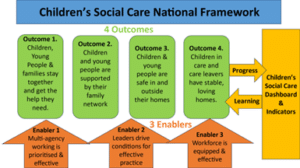Recent history of policy and guidance up to March 2025
Since the Care Review was published in 2023 in England many local authorities have been thinking more about how to develop relational practice and put love into the care system. The previous Government response to the Care Review, Stable Homes, Built on Love outlined the centrality of love and relationships and identified areas for local authorities to take forward.
“This strategy hinges on love and stability, recognising these two fundamentals are what every child – and adult – needs to thrive. Our aim is to create a children’s social care system which priorities love and stability for children and families relentlessly think about how to show effective and compassionate support and love for young people who are looked after and care experienced”.
The National Framework
To support implementation of the strategy the Government introduced the Children’s Social Care National Frame Work. This brings together the purpose of local authority children’s social care, the principles by which children, young people and families should be supported, the enablers that should be in place so the system is effective, and the outcomes that should be achieved so that children and young people can grow up to thrive.
The strategy is based on 3 enablers:
- Multi-agency working is prioritised and effective.
- Leaders drive conditions for effective practice.
- The workforce is equipped and effective.
Above the enablers sit four outcomes:
- Children, Young People & families stay together and get the help they need.
- Children and young people are supported by their family network.
- Children & young people are safe in and outside their homes.
- Children in care and care leavers have stable, loving homes.

The National Framework is supported by the children’s-social-care-dashboard. The dashboard was designed to bring children’s social care data together in one place to understand progress towards the outcomes and enablers identified in the National Framework and it is expected to evolve over time to help better understand the outcomes for young people.
The dashboard is also designed to serve as a learning tool, to allow local authorities to reflect on their own practice and that of others.
Since July 2024, the new Labour Government have built on the previous administration’s response to the Care Review. For example, they are funding local authority pilots in Family Finding and Befriending and Mentoring and have launched their Children’s Wellbeing and Schools Bill (currently, March 2024, moving through the parliamentary process). NB: further guidance to the Children’s Wellbeing and Schools Bill (CWSB) can be found in the Keeping children safe, helping families thrive policy statement (November 2024).
The main areas in the bill for older care experienced young people are Staying close and the Local Offer, both of which are linked to Outcome 4 in the National Framework.
The National Leaving Care Benchmarking Forum (NLCBF), and others, believe the CWSB requires improvement and further development. NLCBF has recommended the following recommendations – these additions would help further establish Relational Practice:
- Extension of corporate parenting duties to other government departments and public bodies (This has now been added by the Government as an amendment Children’s Wellbeing and Schools Bill)
- Staying close: Entitlement beyond local authority assessment (clause 7)
- National offer for care leavers (clause 8)
- Entitlement for care leavers for Lifelong Links support (clause 7/8)
- Dedicated care-experience aware mental health support for care leavers (clause 8)
Challenges with the national policy levers
One of the challenges for local authorities and other organisations is how to develop this legislation and guidance into realistic meaningful and long-term Relational Practice. The challenge remains for Managers, Personal Advisors (PA’s) and other key professionals to find ways to establish, maintain and grow caring and loving relationships with young people.
The current proposals outlined in the CWSB and the dashboard focus mainly on hard targets such as education and housing which are obviously very important but do not provide extensive commentary on the importance of Relational Practice and how to achieve better outcomes for young people.
Ofsted inspection and relational practice
Given the limitations in the Care review response to date in response to relational working another key lever for developing more effective Relational Practice can be found through the Ofsted guidance Inspecting local authority children’s services
For example, in the evaluation criteria it states “a local authority is likely to be judged good if the following apply:
- Care leavers have positive, trusting and stable relationships with personal advisers.
- Care leavers are supported to maintain relationships with people who are important to them (for example, family, friends, carers, former carers and professionals).
- Care leavers have access to a range of social and recreational opportunities that help them to create and maintain supportive and positive relationships.
- Professionals create a culture where young people want to keep in touch
- Care leavers are helped to understand their rights, entitlements and responsibilities
- The local authority consults widely with care leavers and involves them in designing services”.
NLCBF analysis of 75 leaving care Ofsted reports identifies ways in which local authorities are working relationally – see these examples for consideration and inspiration:
- Ofsted commented on South Gloucestershire, “Care leavers have positive, trusting and stable relationships with their personal advisers. Personal advisers are highly committed to their young people, are ambitious for their futures and celebrate their achievements”.
South Gloucestershire Council – Open – Find an Inspection Report – Ofsted
- In Ealing, Ofsted commented “Care leavers are supported by dedicated and caring staff who know them well and build important relationships with them”.
London Borough of Ealing – Open – Find an Inspection Report – Ofsted
In NLCBF we have seen local authorities develop relational practice through the use of Hubs for young people. In these hubs we have seen local authorities develop new ways to develop relationships with young people. If you are interested in knowing more about hubs, please see the links below.
- Transition and Leaving Care Hub (TLC) | Walsall Council
- Enfield Care Leavers Hub – Youth Enfield & Free Activity Portal for Young People
- H&F opens new hub for care leavers in Shepherds Bush
Some more ideas for action:
- Consider the use of independent visitors as detailed in the CWSB.
Safeguarding children – the role of the Independent Visitor | Research in Practice
- Developing participation groups and actively involvement them policy development.
- As research has shown, an effective National Offer for Care Leavers would replicate elements of parental support.
Consider staying put staying close. – Lincolnshire Staying Close 2023
Supporting young people post 25 – NORTH YORKSHIRE COUNTY COUNCIL
- Develop lifelong links – Lifelong Links – Family Rights Group
Lifelong Links: Building lasting relationships for children and young people in care – YouTube
- Develop your local offer to establish your promise to young people based on what they have asked you to do. A really good example is Blackpool who changed their local offer based on the feedback for young people who said they were not good at hello’s and goodbyes –
Blackpool Council childrens services | Care, respect and relationships
Finally, watch what young people think makes a good PA – Relational Practice in action!
How might you use these resources?
- Share this information with your colleagues, senior managers and young people and think about how the CWSB will impact on the service you provide to young people.
- Consider with colleagues how working relationally could help your LA achieve better outcomes in the Dashboard
- Review the Ofsted criteria with colleagues and identify your team’s strengths and areas for development
- If you don’t have a hub in your area, read up about the examples, or even better, go and visit one!
Where can you find out more?
Below you can watch the recording of our webinar accompanying this blog.
This blog is part of a series of resources drawing on the peer learning programme and containing young people’s views, evidence and case studies of why working relationally is important for practice with care experienced young people. Please note that this blog was written in March 2025, we are expecting further developments over the next few months.
Find out more: Relational Practice Resources
